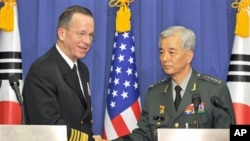The top U.S. military officer is calling for more war games in Northeast Asia, in the wake of what he calls increased North Korean belligerence. The chairman of the Joint Chiefs of Staff also appears to be prodding Tokyo and Seoul to join the United States in a three-way alliance to deter Pyongyang.
The United States and South Korea have agreed to conduct more joint military maneuvers, in response to North Korea's shelling of a South Korean island last month.
Following talks with top South Korean defense officials here Wednesday, the chairman of the U.S. Joint Chiefs of Staff, Admiral Mike Mullen, said it is time for a three-country response to Pyongyang's recent aggression.
"It's important that we look to the future and work together, in terms of making a difference in that stability. So I would hope that we would see more interaction, more trilateral interaction and multilateral interaction in the region in the future to involve South Korea, the United States and Japan," he said.
Mullen will hold talks in Tokyo, Thursday to make that pitch directly to Japanese leaders.
The admiral says the U.S. remains committed to defending Seoul against attack.
Seoul, Tokyo and Washington have rebuffed Beijing's recent call for emergency talks about North Korea.
Mullen expressed the U.S. frustration at China's efforts to rein in Pyongyang.
The four-star admiral says Beijing has unique influence on North Korea and, therefore, bears unique responsibility.
"Now is the time for Beijing to step up to that responsibility and help guide the North and, indeed the entire region, to a better future," he said.
A high-level U.S. delegation is scheduled to go to China next week to directly make that argument.
As the top American officer held talks in Seoul, the sound of distant shelling in North Korea could be heard in the Yellow Sea, near the two country's disputed maritime border.
The artillery firing appeared to be part of a North Korean military exercise, not a renewed attempt to hit South Korea. The South Korean military also is conducting live-fire drills in various locations this week.
North Korea has warned renewed exercises by the South near disputed waters could trigger a new war.
At a news conference with his South Korean counterpart, Admiral Mullen gave tacit approval to Seoul's stance that it will respond to any further shelling of its territory with air strikes on the North.
Mullen told journalists he did not ask South Korea to exclude the option of such strikes on the North.
South Korea's leadership has faced domestic criticism for what was perceived here as a tepid response to the November 23 shelling of Yeonpyeong island. Two South Korean marines and two civilians died in the attack.
US Wants More Military Training with Asian Allies




